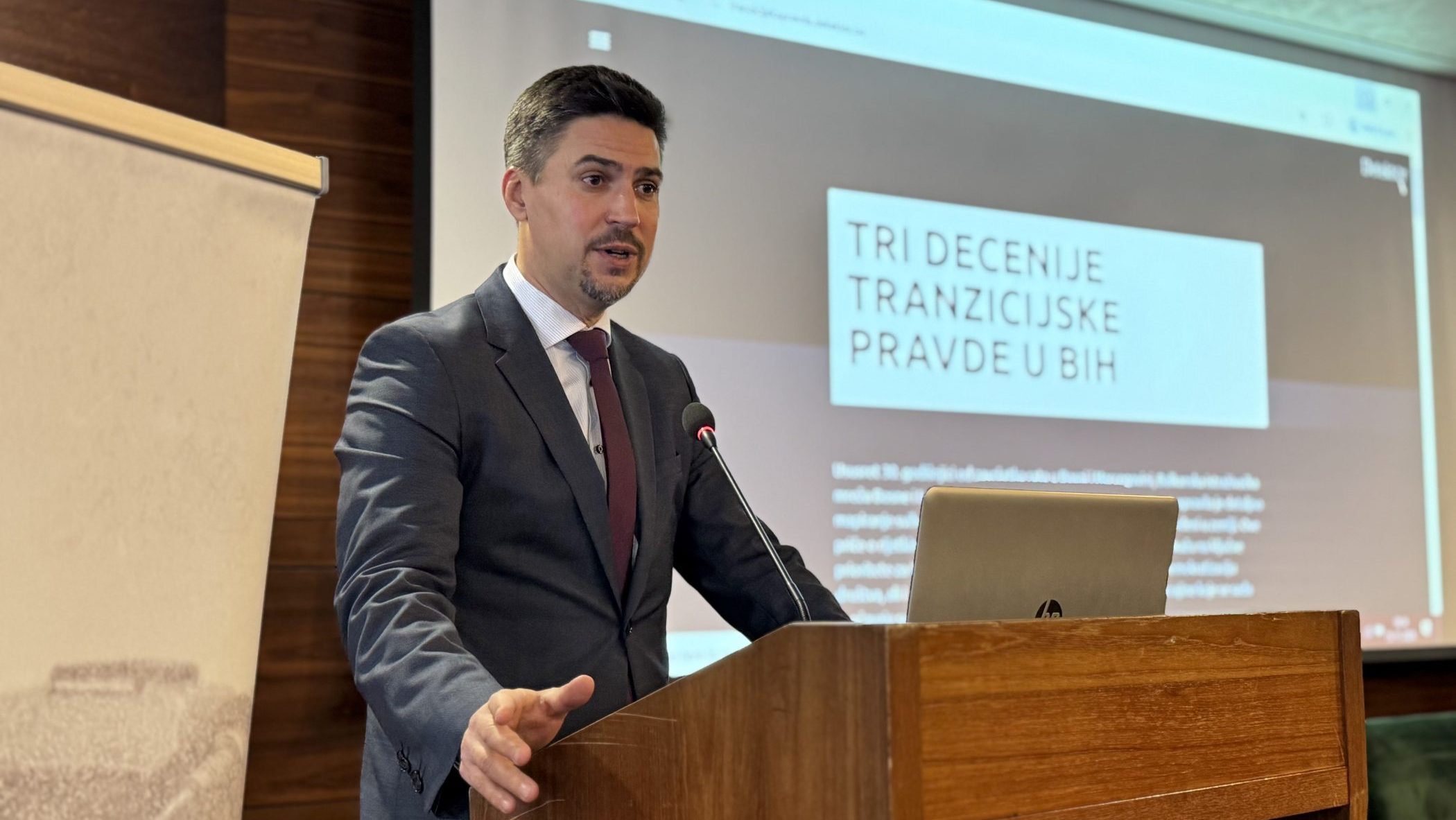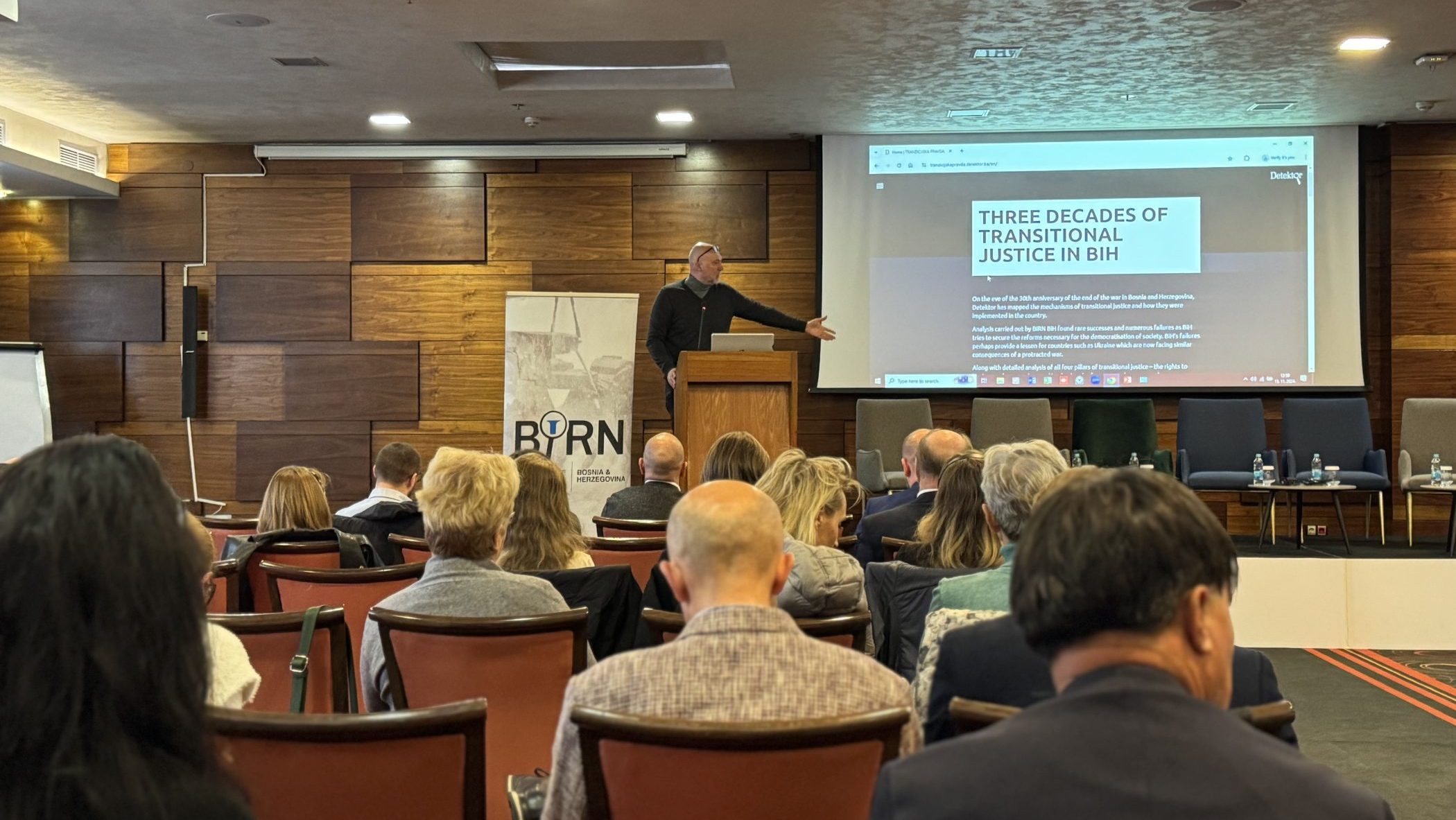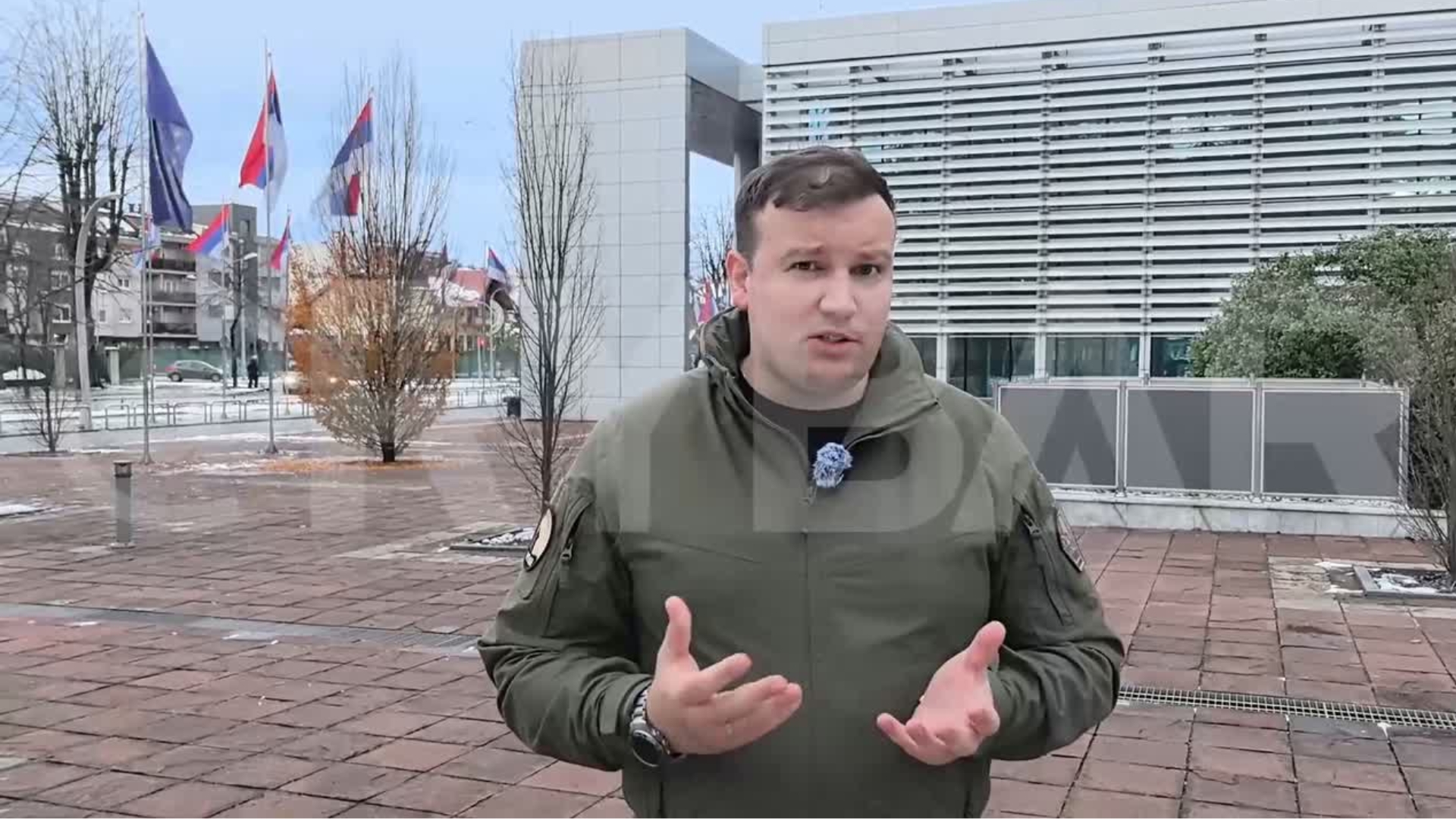This post is also available in: Bosnian
During the conference on the future of transitional justice in Europe, which BIRN BiH organised in Sarajevo ahead of the 30th anniversary of the end of the war in Bosnia, participants discussed the problems facing all transitional justice actors in Bosnia but also in Ukraine, where war is still going on.
Yaroslav Simonov, of Ukraine’s embassy in Bosnia, said they had realized that transitional justice was a process coming after the war ends – but it was very important for its institutions to be formed already. For Ukraine, the experiences of Bosnia are important, and they should learn from them that this is a way to heal war traumas and create a healthy society, he said.
He added that Ukraine has already adopted some legal acts and initiatives, but more was needed for a comprehensive system of transitional justice, especially while war is still ongoing in the country.
Alena Lunova, of the Ukrainian ZMINA human rights centre, said they had begun to think about transitional justice already after Russia’s annexation of Crimea in 2014.
For them, the biggest challenge is that a quarter of Ukraine is still occupied, as well as a public discussion on whether Ukraine really needs transitional justice or not.
“Justice comes in many forms but it must not be delayed. We hope that international experiences will help us,” Lunova added.
Dialogue with victims is essential
 Yaroslav Simonov, chargé d’affaires of the Embassy of Ukraine in BiH. Photo: Detektor
Yaroslav Simonov, chargé d’affaires of the Embassy of Ukraine in BiH. Photo: Detektor
Bosnia’s experience in this field is one of those that has inspired Ukrainians to start dealing with transitional justice in the middle of the war – although the process of working on the Transitional Justice Strategy in Bosnia is still in its infancy, said Sanela Latic, of Bosnia’s Justice Ministry.
The process of drafting the Strategy was suspended in 2010 due to a blockade from Republika Srpska, Bosnia’s Serb-majority entity. The challenges ahead include establishing a working body with representatives of non-governmental and governmental sectors, launching a range of new activities and the risk of a new blockade.
“We emphasized that there will be as many dialogues, debates and talks as possible, in order to collect inputs from all relevant entities for designing the strategy,” Latic said, adding that the funds for relaunching the process would become operational in 2026.
Transitional justice expert Adrijana Hanusic Becirovic said Bosnia has seen many successes in the field but victims still face numerous difficulties. Conducting dialogue with victims and listening to their needs is a foundation for designing transitional justice policies, she said.
“For victims, justice is getting support of society, seeing that war criminals are not glorified, that judicially established facts are not denied and that places of mass suffering are marked,” Hanusic Becirovic explained.
Ukrainian experts said it was important to encourage cooperation with civil society organisations, as they were potential advocates of solutions that the authorities need to adopt. This is especially important when considering the situation of populations in the occupied territories.
Representatives of victims’ associations also referred to the processes of transitional justice in Bosnia, stating that trust and dialogue were crucial, but that political obstacles had to be removed and that, using the experience of Bosnia, Ukraine would have to overcome obstacles if it wanted to achieve reconciliation.
They reiterated that victims must be at the centre of that process and involved in creating solutions.
‘Dehumanization’ is becoming institutionalized
 Refik Hodžić’s expert review at the conference on transitional justice. Photo: Detektor
Refik Hodžić’s expert review at the conference on transitional justice. Photo: Detektor
Sofija Todorovic, of the Youth Initiative for Human Rights, said that dehumanization, along with denial of crimes, was one of the most dangerous processes, and was being institutionalized in Serbia at present.
War criminals and topics from the past were the basis of election campaigns and in that way, Serbian society was trained in one narrative, she noted.
Speaking about global trends in transitional justice, she stated that they did not work in favour of activists, which was why it was time for societies in the region to rely more on domestic forces. “We have to stop relying on the international community and rely on each other, learn to talk, to cooperate,” Todorovic added.
BIRN BiH director Denis Dzidic expressed concern that fighters for transitional justice had become tired, and there was an urgent need not to come to a point where the process is irretrievably lost.
He also believes that the moment when countries from the region are negotiating on EU accession is ideal for additional efforts to be made in this field.
“I don’t say it will be easy, that we will make up for the 30 years lost, but this is the moment to fight with what we have, to insist on some things and to use mechanisms,” Dzidic said, urging civil society also to use the momentum.
Agnes Picod, senior advisor for human rights at the United Nations in Bosnia, said that, in the global trends of the fight for transitional justice, she saw a big problem with disinformation but also in the fact that dialogue and engagement in that topic are neglected, especially by politicians.
“At the heart of the transitional justice process lie the perspectives of victims and survivors, and I think we need to start from that. I think there are very few politicians who listen to victims,” Picod added.
However, she pointed out that there is also hope and that numerous programmes, such as the UN’s Peacebuilding Fund, support certain segments of transitional justice; the fight for a broader human rights framework can ensure the creation of a society that wants to promote truth and justice.
The discussion was concluded by Todorovic and Dzidic, who stated that the transitional justice process must take into account all new factors, such as malign foreign influences, as well as the fact that as countries from the region negotiate on EU accession, it is an opportunity for transitional justice to become part of the public discourse again – but that this time it must not happen behind closed doors.
The conference was organised as part of the project “Strategic Review of Transitional Justice Process through the Media”, which is implemented with the support of the Federal Public Service for Foreign Affairs of Belgium.


